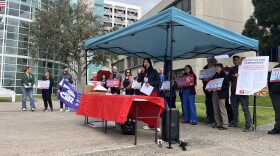San Diego County could stop sending law enforcement to nonviolent mental health calls and change how shootings by San Diego Sheriff's deputies are investigated under a series of reforms San Diego County Supervisor Nathan Fletcher proposed Friday.
In one, Fletcher asked to speed up the creation of a non-law enforcement "Mobile Crisis Response Team" where clinicians instead of police would respond to nonviolent incidents countywide involving people with behavioral health crises.
"Law enforcement's presence often escalates the situation," Fletcher said. "It can heighten anxiety and it is not the appropriate use of the time and resources of law enforcement, nor does it get us the right outcome."
RELATED: Records Show Racial Disparities When San Diego Law Enforcement Uses Force
Khalid Alexander with the criminal justice advocacy reform organization Pillars of the Community said reforms such as having mental health professionals instead of police respond to behavioral crisis calls shouldn't be considered groundbreaking.
"However, they are an important step in the right direction," he said. "They are an important step to get us to a place where real conversations about real change can begin to happen."
The Mobile Crisis Response Teams were part of a long list of proposals that Fletcher will ask the county supervisors to vote on next week. They include establishing an Office of Equity and Racial Justice for San Diego County that would help people of color get county contracts, look for grants for restorative justice and do outreach to underserved communities.
He also proposed increasing the oversight role of the Citizens' Law Enforcement Review Board, or CLERB. The board conducts independent investigations of citizen complaints of misconduct by sheriff's deputies and probation officers employed by the county.
RELATED: KPBS Lawsuit Reveals Unanswered Citizen Complaints Against Sheriff’s Department
Fletcher proposed giving the board the authority to investigate any incidents involving Sheriff's deputies where a weapon was fired, force was used resulting in great bodily injury, or force was used at a protest. Currently, a complaint must be filed for CLERB to do an investigation.
Fletcher's proposals go before the Board of Supervisors for a vote on Tuesday. The reforms would only apply to the San Diego Sheriff's Department, not police officers from cities including San Diego. Last week, San Diego Mayor Kevin Faulconer said the San Diego Police Department would announce a new de-escalation policy this week.
On Friday, a mayoral spokesman said city staff are still working with two citizens advisory boards on the details, and that an announcement about the San Diego Police Department would come early next week.








